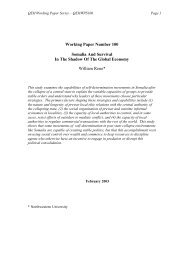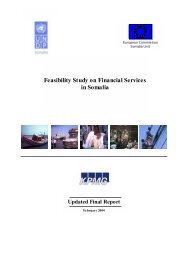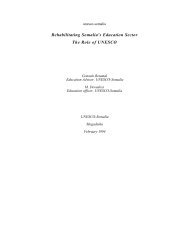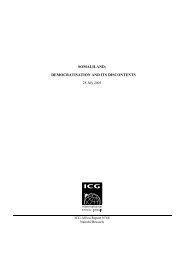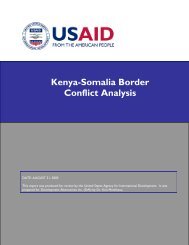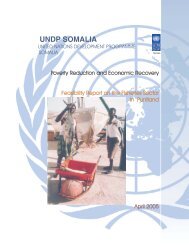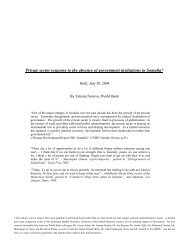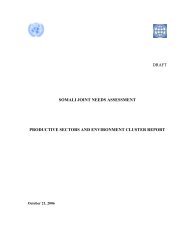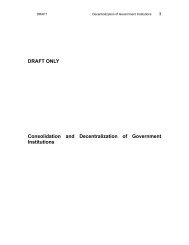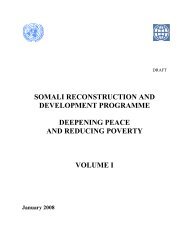Primary Education Survey Evaluation Report Somalia - Somali - JNA
Primary Education Survey Evaluation Report Somalia - Somali - JNA
Primary Education Survey Evaluation Report Somalia - Somali - JNA
You also want an ePaper? Increase the reach of your titles
YUMPU automatically turns print PDFs into web optimized ePapers that Google loves.
PES <strong>Evaluation</strong> <strong>Report</strong>, 2008<br />
Currently common practice in agencies and NGOs is to sustain separateness between sectors such as<br />
education, health, water and sanitation, child protection etc. While attempts are made to have a more<br />
integrated approach to programme planning through constructs such as focusing on common regions or<br />
the identification of ‘cross cutting’ issues in an attempt to achieve synergies of programming effort, such<br />
attempts are not often reflected in systematic programme infrastructure and often have to be achieved<br />
through an additional layer of arrangements internal to an organisation. One approach to build a more<br />
systematic infrastructure to achieve cross sector cooperation is the DevInfo data base that stores key<br />
indices for all sectors across many countries to facilitate more holistic analyses. DevInfo tends to focus on<br />
macro level data with some disaggregation.<br />
There does appear to be an opportunity to further enhance impact through the programme infrastructure<br />
by allowing cross sector investigations to be made by linking the EMIS to the Health IMS at district, and<br />
community level to allow systematic investigations to be made in support of holistic programming<br />
activities. This together with a mapping process facilitated by the GPS coordinates being collected will<br />
allow for some detailed and holistic micro level reporting that will be particularly valuable in emergency<br />
situations. Hence, enhancing impact of the existing data collection and storage processes across sectors.<br />
Recommendation<br />
a. That impact of the PES be improved by implementation of the recommendations of this report in<br />
the areas of diversified reporting, capacity building on data use, broadening the scope of data<br />
collected, decentralisation of PES processes and linking PES to other data systems<br />
E. SUSTAINABILITY<br />
Findings and Analysis<br />
If sustainability of the process means that the MoEs can undertake the PES independently of outside<br />
technical assistance and funding support, then it is abundantly evident that the process is not sustainable<br />
now. Ministries are dependent on UNICEF for funding, organisation, conceptual overview, monitoring<br />
and much of the motivation for undertaking the annual survey. One Director General, while<br />
understanding the notion and need for sustainability sees UNICEF as part of that sustainability.<br />
UNICEF is not like a small NGO, it will be here in the future.<br />
Clearly the DG has a different concept of sustainability than that suggested above. The need has already<br />
been discussed for the carefully designed structures and capacity building procedures at ministry level.<br />
These are emerging and UNICEF contributions of Planning and EMIS technical assistance and the<br />
establishment of an EMIS unit for each of the three ministries will be important contributions to<br />
sustainability. The extent to which they are successful obviously will impact on sustainability.<br />
To the extent that lack of quality staff is seen as a threat to sustainability, it may be necessary to look for<br />
different arrangements that the traditional employment of staff to permanent positions within the MoEs to<br />
meet capacity demands of the EMIS. One possible alternative arrangement is to issue outsourcing tenders<br />
to undertake the work to suitable institutions that can exhibit the appropriate management and technical<br />
skills. Such an institution may be the local institutes of higher learning which might be expected to have<br />
suitable research, data collection and IT skills available. Such ‘outsourcing’ strategies would have the<br />
advantage of providing funding support for students and could assist in developing genuine research<br />
interest in the data to link with the concept of generating specialist reports on particular areas of the<br />
education sector.<br />
In addition to the above general concepts there are a number of perceived threats to sustainability specific<br />
to the local contexts that are listed here.<br />
1. The EMIS units will have to be staffed with capable and professional local people. It was often<br />
said that trained local staff are hard to hold due to the demand to trained staff from other<br />
36



